Apex Equities Limited is a forex brokerage headquartered in New Zealand. This article provides a comprehensive analysis of its background, investment packages, and potential risks.
1. Apex Equities Limited Company Background
Apex Equities Limited is a forex brokerage company established in 2018 and headquartered in Tainui, Dunedin, on New Zealand’s South Island. Its registered address is 7 Gresham Street, Dunedin, New Zealand. Apex Equities Limited primarily provides forex trading services to investors and covers a variety of asset classes, including oil, natural gas, real estate, gold, and cryptocurrency. In September 2024, the company officially launched its website to expand its business reach. The company’s name is notable within the industry. However, concerns have emerged about its legitimacy and regulatory compliance. Ambiguous information about its registration and regulatory status on New Zealand’s official platforms adds to these doubts.
2. Apex Equities Limited Domain Registration Information
Whois records show that Apex Equities Limited registered its website domain on September 26, 2024. This suggests a significant gap between the company’s founding and its website launch. Most financial companies, especially forex brokers, launch their websites shortly after or even before establishing themselves to show transparency and compliance. Thus, the delayed launch of Apex Equities Limited’s website has raised questions in the industry regarding its legitimacy.
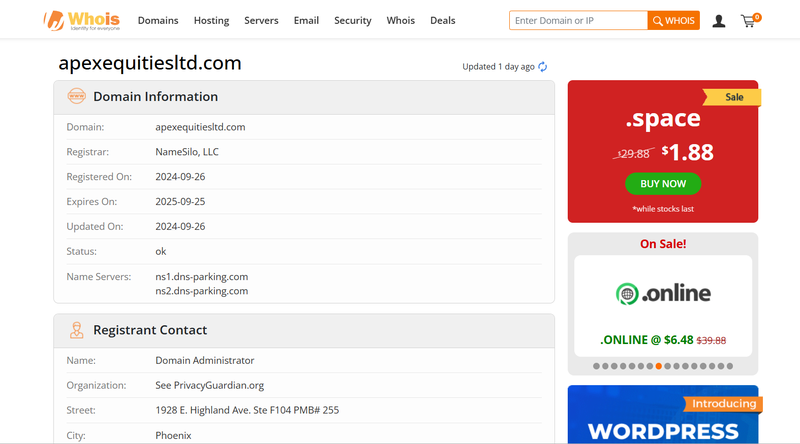
3. Registration Information and Regulatory Status
3.1 Company Registration Information
According to the New Zealand Companies Office, Apex Equities Limited was officially registered on June 29, 2018, with the registration number 6900036. This confirms that the company has a formal registration record in New Zealand. Notably, there is another company of the same name (also called Apex Equities Limited), registered even earlier on May 17, 2007, with registration number 1941870, but this company has since been removed from the register.
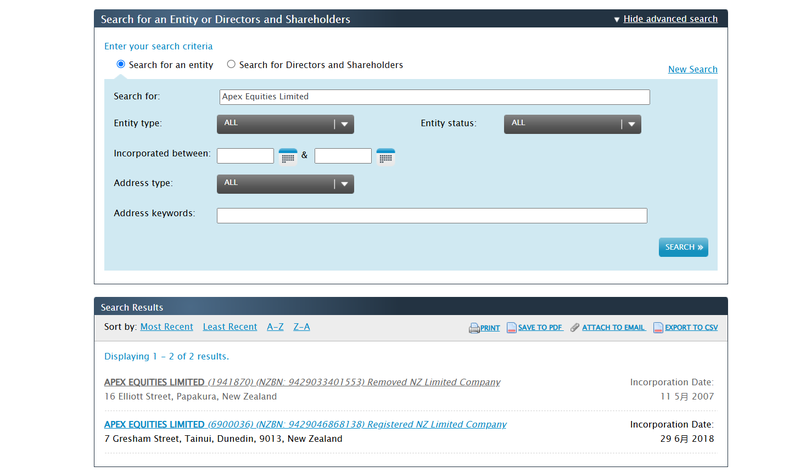
3.2 Changes in Company Registration
Records from the New Zealand Companies Office show that the earlier Apex Equities Limited, registered in 2007, no longer holds an active registration. The register also includes a notice indicating plans to cancel Apex Equities Limited’s registration under Section 318 of the Companies Act 1993. This change raises concerns about the operational compliance of the current company and whether it is operating under typical standards.
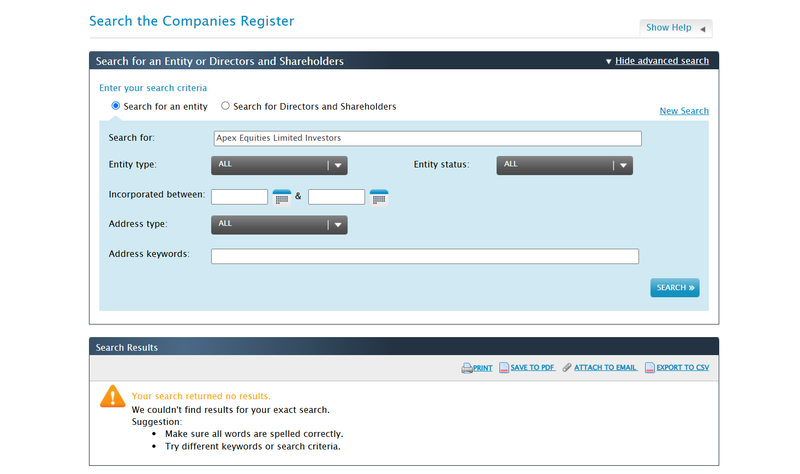
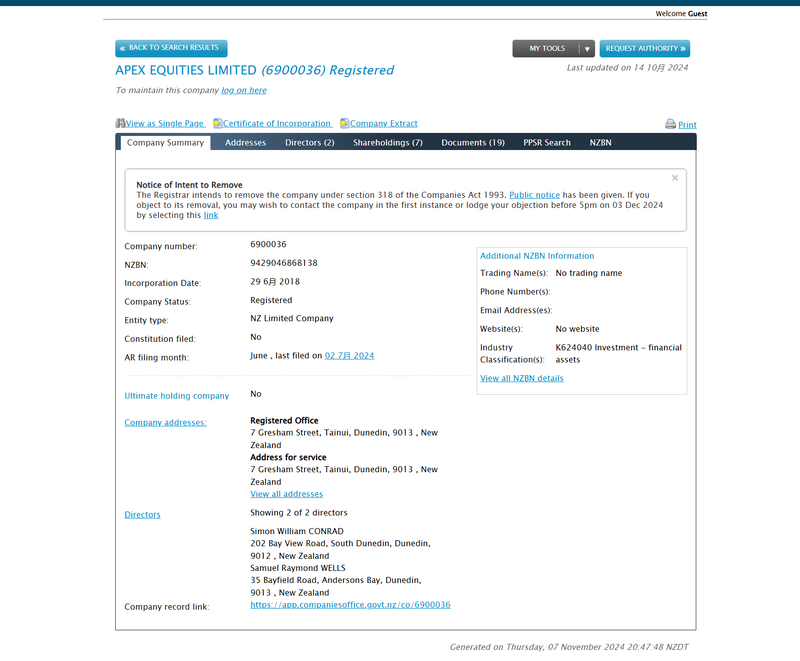
3.3 Lack of Regulatory Information
The official website of Apex Equities Limited states it is part of Apex Equities Limited Investors. However, the New Zealand Companies Register offers no detailed registration information for this entity, nor does any evidence indicate regulation by the New Zealand Financial Markets Authority (FMA) or other reputable regulatory institutions. For a forex broker, obtaining regulatory certification is not only a way to protect investors’ interests but also to demonstrate its compliance to the market. The lack of regulatory information on Apex Equities Limited is a critical shortcoming, which may significantly lower the confidence of potential investors.
4. Legacy Domain and Company Deregistration Record
4.1 Legacy Domain and Company Registration History
The earlier Apex Equities Limited (registered in 2007 under registration number 1941870) was officially registered but was later deregistered. This may indicate operational or legal compliance issues, adding uncertainty to the new Apex Equities Limited. For investors, a company’s history and consistency are essential indicators of a broker’s reputation, and the removal of the legacy domain raises potential risks for those considering investment.
4.2 Relationship Between Domain and Trustworthiness
A financial institution’s domain is often seen as a symbol of credibility. For companies with a long history, the stability of the domain is crucial for investor confidence. The break in continuity with Apex Equities Limited’s new domain may cause investors to question the company’s stability and transparency. Such inconsistencies, especially in investment decisions, add to the complexity of decision-making for investors.
5. Apex Equities Limited Investment Packages and Daily Return Rate Analysis
Apex Equities Limited offers investors three investment packages: the Entrant Plan, Systematic Plan, and Principal Plan. Each plan differs in terms of investment cycle, deposit amounts, and referral bonuses to attract investors with varying risk appetites. However, these plans’ high returns and short investment cycles merit closer examination, as maintaining such high returns is challenging for a regulated forex broker. Below is an analysis of the characteristics and potential risks of each package.
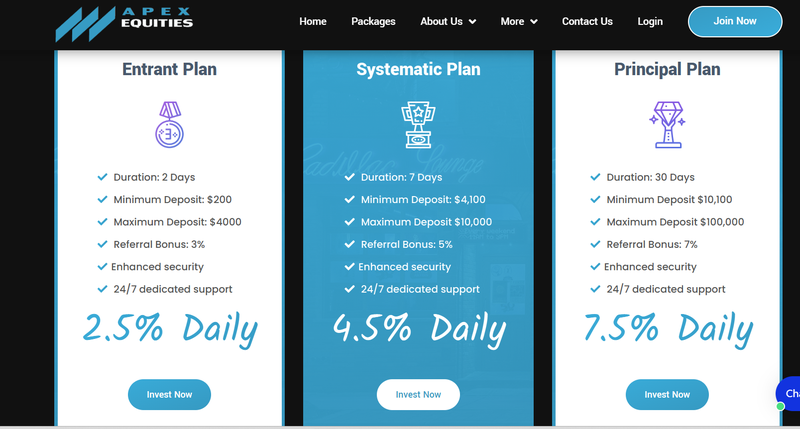
5.1 Entrant Plan
The Entrant Plan is aimed at short-term investors with an investment cycle of 2 days, a minimum deposit of $200, and a maximum of $4,000. The referral bonus is 3%, with a daily return rate of 2.5%.
From an industry standard perspective, the daily return rate of 2.5% for the Entrant Plan is very high. For example, if one invests $2,000, the return after two days would be $100. Although short-term high returns are appealing, achieving high returns requires an extremely high trading success rate, which is difficult to achieve on regulated and legitimate forex platforms. Such a high return rate may indicate that the platform adopts a high-risk, unsustainable investment strategy, putting investors’ principal at high liquidity risk.
5.2 Systematic Plan
The Systematic Plan has a cycle of 7 days, with a minimum deposit of $4,100 and a maximum deposit of $10,000. The referral bonus rate is 5%, with a daily return rate of 4.5%.
Compared to the Entrant Plan, the Systematic Plan has a higher investment threshold and an increased return rate. For a minimum investment of $4,100, the return after 7 days would be close to $1,290. Forex markets typically do not yield such high short-term profits, and a daily return rate of 4.5% would be difficult to achieve through legitimate investment strategies. Such a high rate of return may imply that the company relies on funds from new investors to pay returns to current investors, a model that, without sufficient cash flow, can lead to a collapse of the funding chain, exposing investors to significant losses.
5.3 Principal Plan
The Principal Plan is Apex Equities Limited’s highest investment option, with a cycle of 30 days, a minimum deposit of $10,100, and a maximum deposit of $100,000. The referral bonus is 7%, with a daily return rate of 7.5%.
The Principal Plan offers the highest return rate but also requires the largest investment from investors. If an investor deposits the minimum amount of $10,100, they would receive over $22,725 in returns after one month. The average daily fluctuations in the forex market are typically not enough to support such a high return level. A daily return rate of 7.5% is almost impossible to achieve through regular forex market operations. This rate likely involves high-risk or opaque fund management methods, which could render the platform unsustainable in the long run.
Potential Risks of High Return Rates
The three investment plans offered by Apex Equities Limited show return rates significantly higher than industry averages, with substantial short-term returns. Such high return promises are rare in the forex industry, and for a platform to maintain such rates legitimately would require significant operational pressure. Typically, legitimate and regulated forex brokers set return rates based on market fluctuations rather than attracting investors through extremely high yields. Thus, Apex Equities Limited’s high return promise may involve the following risks:
- Unsustainability: Offering high returns in the short term is generally difficult to maintain over the long term. If market fluctuations or the number of new investors decrease, the platform may be unable to continue operating.
- Potential Fund Chain Risk: The high return rate may indicate reliance on funds from new investors to pay returns to current investors. This method can easily lead to a funding chain collapse if the platform cannot attract new capital or make timely payments, resulting in potential losses for investors.
- Non-transparent Risk Management: Unregulated platforms generally have vague operating models, and the disconnect between return rates and market fluctuations may indicate a lack of transparency in fund management, making it difficult for investors to understand the actual use of funds and risk exposure.
In summary, Apex Equities Limited’s investment packages may present sustainability issues and funding risks due to the high returns they promise. Investors should exercise caution when choosing high-risk platforms of this nature and carefully consider whether these risks align with their investment preferences and risk tolerance.
6. Potential Risks Faced by Investors
6.1 Risks of Investing in an Unregulated Platform
Apex Equities Limited lacks regulatory oversight from a reputable body, meaning its operations and management lack third-party supervision, which increases risks for investors. Unregulated platforms often struggle to guarantee fund security, and investors may face difficulties seeking legal protection in the event of disputes.
6.2 Risks of High Return Promises
The daily return rate offered by Apex Equities Limited, ranging from 2.5% to 7.5%, is significantly higher than the market average. While high returns may be tempting, they often come with high risk in practice, with potential issues related to fund liquidity or platform instability.
6.3 Unreasonable Deposit Ranges
The three investment packages have wide deposit ranges, from $200 to $100,000. Typically, legitimate investment platforms provide reasonable choices in terms of investment amounts and proportions. However, Apex Equities Limited’s wide deposit range poses significant risks for investors regarding fund security.
7. Important Considerations When Investing in Apex Equities Limited
7.1 Transparency Issues
Due to the lack of regulatory information and the complexity of the company’s background, investors should be particularly cautious about the platform’s transparency. Before investing, they should fully understand the platform’s fund management processes and risk control measures.
7.2 Ongoing Monitoring of Return Payments
If investors choose to proceed, they should closely monitor the daily returns. In case of payment irregularities, prompt action may help minimize potential losses.
8. Conclusion: Analysis of Apex Equities Limited’s Legitimacy and Security
As a New Zealand-registered forex broker, Apex Equities Limited claims to offer high returns and diversified investment products, yet there is uncertainty regarding its registration and regulatory status. Before investing, investors should be wary of the platform’s high return rates and lack of regulatory oversight and avoid making large investments without legal safeguards. For general investors, it is advisable to choose regulated platforms with a balanced risk-return ratio to ensure fund security and controllable risks.
FAQ
1. Is Apex Equities Limited a legitimate brokerage?
Apex Equities Limited registers in New Zealand but lacks certification from any reputable financial authority, which raises concerns about its legitimacy and compliance.
2. Are the company’s daily return rates reliable?
The daily return rates offered by Apex Equities Limited are above the market average, so investors should be cautious of its potential unsustainability.
3. What are the risks of investing in Apex Equities Limited?
The platform’s lack of regulatory status, high daily returns, and unreasonable deposit ranges contribute to higher investment risk.
4. How can I verify Apex Equities Limited’s registration information?
Investors can check the New Zealand Companies Register, though some information inconsistencies should be noted.
5. Is it advisable to invest on an unregulated platform?
Generally, it is not recommended, as unregulated platforms lack independent oversight, making fund security challenging to ensure.
6. How can I assess the platform’s compliance?
Review certifications from reputable regulatory authorities and check the company’s background, taking the platform’s return rate into account to judge its compliance.



